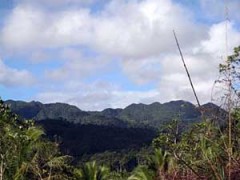
Address: Southern Leyte
Description: Mt. Nacolod is a very high priority key biodiversity area (KBA). It is a prime location for the region’s flora and fauna, being home to more than half of Leyte's known plant species. It harbors 134 birds, 111 herpetofauna species, and almost all known mammal species recorded in this area. A recent survey of this KBA also brought new discoveries: three species of volant mammals, cinnamon, and two new frog species of the Platymantis family. However, the conservation of Mt. Nacolod is still challenged by illegal collection and poaching of wildlife, conversion to agricultural use, and conflicting land tenurialship, among others.
Status: Newly Opened
| Area | 14,000 hectares (ha) |
| Bio-geographic features | A declared forest reserve, one of two Key Biodiversity Areas (KBA) identified in Mt. Nacolod is partly situated in Southern Leyte Province. Vegetation in the area is mainly composed of regenerating second to old growth forest and patches of cultivated area in forest edges. |
| Flora | 229 flora species in 65 families, with 31 Philippine endemics, 10 IUCN-critically endangered species which are mostly Dipterocarp species and 20 IUCN-vulnerable species |
| Fauna |
Mt. Nacolod is home to a diverse set of birds (41 of which are endemic to the Philippines, 14 endemic to the Visayas and the Greater Mindanao faunal region); mammals (17 species [or 47%] are Philippine endemics of which 8 are restricted only to the Mindanao faunal region). It is home to highly threatened endemic bird species such as the Philippine Cockatoo (Cacatua haematurupygia), the Visayas wattled-broadbill (Sarcophanops samarensis), and the forest specialist Walden’s hornbill, (Aceros waldenii). |
| Other Matters of significance | The most recent conservation efforts in the site were to demonstrate REDD+ in 2010 and to pilot new conservation approaches (NEWCAPP 2012), DENR-led efforts that had complements from staunch conservation supporters such as the GIZ, USAID, and the Foundation for the Philippine Environment, among others. The most important outcome of these efforts, apart from putting Southern Leyte in the conservation map globally with the discovery of the two new species of frogs (Platymantis spp.), was the declaration of Mt. Nacolod by the provincial government of Southern Leyte as a Local Conservation Area (LCA - with resource allocations for its conservation and protection) triggered by the identification of at least six High Conservation Value Areas (HCVAs). The identified HCVAs came with a package of concrete management options that would assist in furthering these sites’ conservation. |
Biodiversity and forest threats mapping on the ground identified the following:
| Date | Project | Amount Funded | Proponent |
| 2016 |
Refining Biodiversity Conservation targets in High Conservation Value Areas (HCVA) in the Mt. Nacolod Landscape Building on the gains of the previous engagements in Mt. Nacolod, the project aims to complete profiling of High Conservation Value Areas (HCVAs) in Mt. Nacolod and Southern Leyte by verifying and gathering more baseline information; gather baseline information on unique key trigger species and major threats that would serve as a guide for proper conservation action; and create a social fence around Mt. Nacolod by assisting communities to act as a buffer against the entry of destructive activities from surrounding areas. |
PhP1,673,600 | South Pacific Integrated Development Foundation, Inc. |
| 2015 | Conservation Management Workshop - Mt. Nacolod Key Biodiversity Area | PhP120,700 | FPE Visayas Regional Unit |
| 2015 | Strengthening Community Participation of the Peoples Organization in Barangay Pansaan, Mt. Nacolod | PhP200,000 | Barangay Pansaan Reforestation Organization |
| 2013 | Mt. Nacolod Landscape Stakeholders' Analysis | PhP97,350 | VISCA Foundation for Agricultural and Rural Development, Inc. |
| 2012 | Resource and Socio-Economic Assessment of Mt. Nacolod Landscape | PhP1,000,000 | Mahintana Foundation, Inc. |